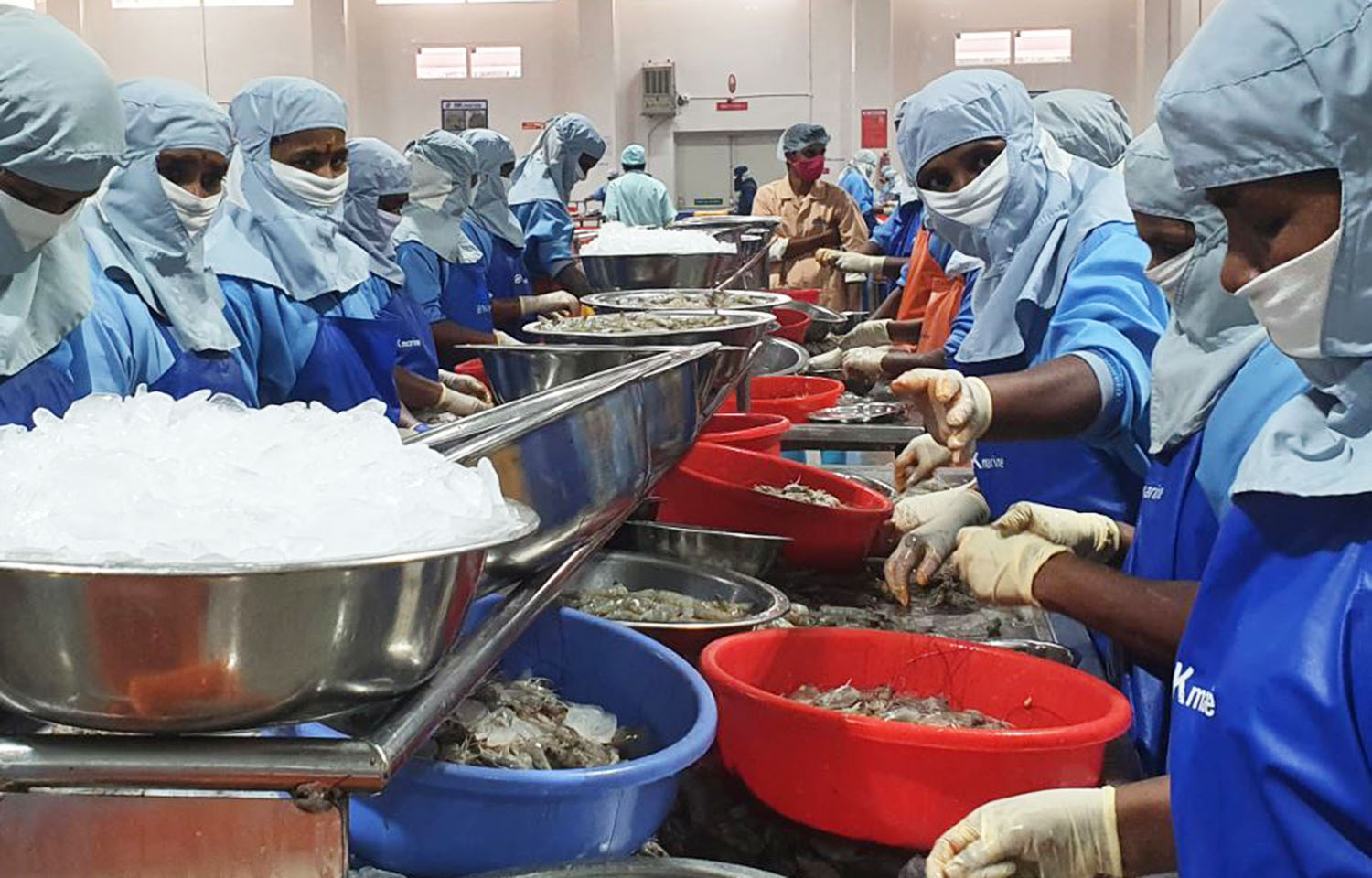Separate reports from the Corporate Accountability Lab, the Associated Press, and the Outlaw Ocean Project published on 20 March have painted a grim portrait of India’s shrimp industry.
The report from the Corporate Accountability Lab (CAL), a nongovernmental organization dedicated to addressing “the failure of domestic and international legal regimes to hold companies accountable for abuses in their global supply chains,” presents evidence of forced labor, child labor, and environmental problems in India’s shrimp sector.
Its report, “Hidden Harvest: Human Rights and Environmental Abuses in India’s Shrimp Industry,” found labor issues at Indian shrimp hatcheries, farms, peeling sheds, and processing plants, as well as mangrove destruction and water contamination from shrimp farm effluent.
The Associated Press story, written by one of the reporters involved in a 2015 investigation into labor abuse in Thailand’s shrimp sector, was completed after the Associated Press received an advance copy of the CAL report. The article features interviews with shrimp sector workers alleging low pay, substandard working conditions, and suffering caused by farm runoff tainting local drinking water.
The Outlaw Ocean Project report, the latest in a series investigating abuses in the global seafood industry, primarily relies on the narrative of Joshua Farinella, a 45-year-old Pennsylvania resident who was hired in October 2023 to work as the general manager of a new processing facility being built in India by Kerala-based shrimp processing and exporting firm Choice Canning. While the facility was being completed, Farinella temporarily took over management at an existing facility operated by the company, where he observed labor conditions he said upset him enough that he contacted the Outlaw Ocean Project.
In response to the AP report, Sysco, Great American Seafood, Rich Products, Walmart, Eastern Fish Company, and Nekkanti Sea Foods issued statements outlining their buying policies or addressing particular issues raised by the article. The Outlaw Ocean Project has published all its interactions with companies affiliated with Choice Canning, including a lengthy response from the Indian firm which delves into Farinella’s multiple felony convictions.
Choice Canning Vice President of Sales and Procurement Jacob Jose provided an additional response to the report in an interview with SeafoodSource.
Nevertheless, the reports spurred a response from U.S. elected officials, including U.S. Senator Bill Cassidy (R-Louisiana).
“Today’s report outlining the abuses at Choice Canning Company’s shrimp-processing factory in India makes clear why Indian shrimp does not belong on the shelf alongside Louisiana shrimp,” Cassidy said. “Indian shrimp relies on forced labor and is pumped full of illegal antibiotics. The [United States Trade Representative] needs to act to ensure American consumers are not put in harm’s way.”
A letter addressed to Farinella from U.S. Representative Raúl Grijalva (D-Arizona), U.S. Rep. Jared Huffman (D-California), and U.S. Rep. Melanie Stansbury (D-New Mexico) asked him to present any evidence he had collected that Choice Canning had violated Section 307 of the Tariff Act of 1930 prohibiting the importation of any product derived from forced labor; The Lacey Act, prohibiting the import or sale of illegally obtained fish products; the Magnuson-Stevens Fishery Conservation and Management Act, which prohibits fraudulent reporting through the Seafood Import Monitoring Program; or the Federal Food, Drug, and Cosmetic Act, which prohibits the illegal use of antibiotics.
The trio also asked Farinella to provide evidence Choice Canning had not followed standards outlined by the Best Aquaculture Practices (BAP) certification, which the company has championed, becoming the first India-based company supporting BAP certification to join the certification’s operator, the Global Seafood Alliance, as a corporate member in 2022.
The Outlaw Ocean Project previously found weak social auditing processes, including heavy reliance on self-assessments, allowed the presence of Uyghurs in Chinese seafood-processing facilities to go undetected by seafood certification providers, including the Marine Stewardship Council, the Aquaculture Stewardship Council, and the British Retail Consortium. Outlaw Ocean also found problems with an SGS audit of Choice Canning’s Amalapuram facility to determine whether it met Brand Reputation Compliance (BRC) Global Standards – a food safety certification. The Outlaw Ocean Project also published an explanation of the methodology it used for itsinvestigation, as well as the full threads of WhatsApp and Email exchanges.
“The result of this breakdown in proper auditing practices is that multiple categories of problematic food products – some produced with forced labor, some containing banned antibiotics, or some infected with salmonella or other bacteria – make it to the shelves of supermarkets and on the menus of restaurants across the U.S.,” Outlaw Ocean reported.
Global Seafood Alliance Vice President of Marketing and Communications Devan Meserve said she had no immediate additional comment beyond the statement GSA issued to the Outlaw Ocean Project.
"The Global Seafood Alliance appreciates The Outlaw Ocean Project bringing this to our attention. We take these matters very seriously,” Meserve said. “When credible evidence of activities in violation of our Best Aquaculture Practices standards are reported, they are thoroughly investigated. The process is managed by our Program Integrity department, with involvement of specialized and impartial third-party investigators.”
In an interview with SeafoodSource, Farinella, who has filed formal whistleblower complaints with the U.S. Food and Drug Administration and several other federal agencies, reiterated the allegations against Choice Canning reported by the Outlaw Ocean Project.
“[I did this] because change needs to happen – both in consumers knowing that their product is safe and knowing that all of these workers, no matter where they are ... should be treated with that same amount of respect, regardless of where they’re from or what they’re doing,” he said. “So, I'm doing this because I want to see a change, or at least the beginnings of a change.”
In its report, CAL provided a list of recommendations for ...








